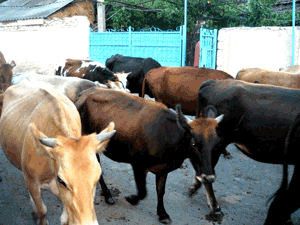 Saba Tsitsikashvili, Gori
Saba Tsitsikashvili, Gori
The inhabitants of Gori district villages have been collecting 5 GEL per family for several days now. The villagers had wanted to buy pastures in order to keep strangers away from their plots. However, the majority of villages could not manage to purchase the pastures collectively. Consequently, private entrepreneurs bought pastures and arable land plots. Now it is pointless to collect money and buy out the plots for these poor villagers
The large-scaled privatization has resulted in lost of pastures and grazing rights for peasants. The village inhabitants don’t know what to do when faced with the lost of their means of survival. The herdsmen take either their herds or flocks to the same place to graze and drink water. Their pastures have been so overgrazed that there is nothing for them to eat – and the end they bring their underfed and undernourished livestock home in the evening.
Private Pastures are closed to the herdsmen.
Vakhtang Lezhava, Deputy Minister of Economics stated that unless the money is invested in the villages than villagers will lose their source of income. Mr. Lezhava explains that a large amount of investments will enable farmers to buy technical equipment. This means that ordinary workers will lose their jobs to technology. Besides when a farmer owns good equipment he can afford buying the plots of neighbors. Nonetheless, neighbors will lose their plots and their jobs as well.
Kakha Bendukidze, head of President’s administration shares such an opinion. He considers that everyone is employed in the villages, as everyone has plot and cultivates the plots; farmers can sell their harvest and earn a living.
However, the reality is much different….
The head of the family gets up at dawn and takes the cows to pasture. The members of the families which own one cow must work as a herdsman once in a month. If they can not go there personally they must than pay 5 GEL to a hired herdsman in their place. There are professional herdsmen in the villages of Georgia. They take herd to the pasture every day and each family pays them 5 GEL for their service. The family which hires the herdsman must also provide him with food.
The herdsmen must be attentive so that the cows don’t trespass on the territory of private property owners. If a proprietor finds out about the infringement he will demand to fine the herd owners; the peasants are then obligated to collect money and pay a fine.
If a cow falls into a ravine, the villagers have to collect money again and buy a new cow in replacement for the owner of the animal.
The homemakers work the milk and make matsoni as well as cheese in Georgian villages. Home produced food is then sold in the city very well. The matsoni and cheese produced in the villages is cheaper than a factory made dairy products. However, the city dwellers know that the diary products from the villages are genuine.
“The village cows don’t produce much milk. Therefore we make matsoni and cheese from the milk we gather in 2-3 days and not in a single day. One half liter of matsoni costs 50 Tetries. Can you imagine the number of pots one person ought to sell in the city in order to gain a reasonably profit on a daily basis. One person can work approximately 20 pots every day. One can not take more than that – and there are two reasons, firstly they are expensive and secondly there is large chance that they will break in transport. We have some expenses to cover: travel cost, food. In the end we take home not much money,” says a homemaker.
The dairy company Eco Food has been visiting the villages recently. They buy one litre milk for 30 Tetries. Normally Georgian villagers have 3 cows. Each produces maximum 6-7 litres of milk per day. Based on the simple calculation we can assume that one family can sell 20 liters to Eco Food per day and receive only 6 GEL. However, we must take into account that not all 20 liters are sold some part is used at home by the families themselves, and as a result villagers have little profit from this business.
The cows need food and forage in winter. Peasants must harvest hay for the herd. This year it has been lots of rain and much hay was lost in the field. Also, the season has not been good and the hay did not grow well – and it is difficult to cut the hay and bail it under good conditions. More money is spent on harvesting and transporting the hay. Fuel, cars, workers and so on – and these investments are necessary to take hay from the fields.
Apart from cows, the families have to take care of their private lands and the problems of watering their plots. Unlike last year the villages of Gori District have fewer problems regarding irrigation water. Much money was allocated towards rehabilitation of Tiriponi and Saltvisi irrigation canals. The canals are built on the territory of Tskhinvali breakaway regions. The Tskhinvali (South Ossetian) de-facto government can cut down water supply whenever it wishes. The de-facto government used to demand from Georgians 1,500- 2 000 GEL in exchange for water. As a response from the Georgian side the warning has been made that roads for the Ossetian side will be block to Tskhinvali, it capitol, should the water be cut, which gets the attention of the Ossetians.



